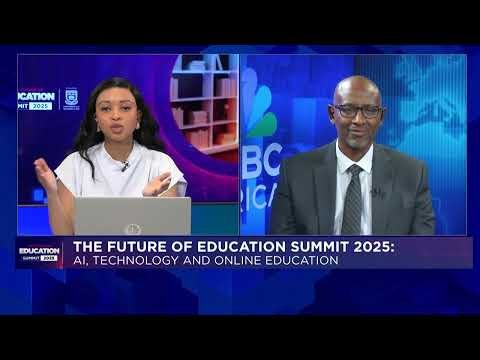Education
NEA Gets $325K Microsoft Grant to Expand AI Education Initiative

NEA president: This technology will continue to fundamentally change the way we teach and learn
“Understanding AI goes far beyond tools and apps. This technology will continue to fundamentally change the way we teach and learn, and the ways we interact with the world and each other,” said NEA President Becky Pringle. “Our students and educators cannot be passive users; they must have agency with this technology and an appreciation for the uniquely human assets we bring to learning and to our professions.”
“Educators prepare every generation to meet the future — and today, they’re shaping how AI becomes a tool for confidence, creativity and critical thinking,” said Brad Smith, Vice Chair and President of Microsoft. “Our partnership with NEA is rooted in a simple truth: Technology is only as valuable as the people empowered to use it. Through Microsoft Elevate, we’re investing in AI literacy and leadership, so educators and students stay at the center of AI in the classroom.”
Last year, NEA partnered with the International Society for Technology in Education (ISTE) to deliver an AI learning series that reached thousands of members. Building on that success, the new Microsoft grant will enable NEA to engage an additional 10,000 members with fresh content and micro-credentials, further strengthening the knowledge and fluency of both educators and leaders in this emerging field. The grant will also support a dedicated focus on policy and leadership development for NEA’s state affiliates.
“By preparing educators and leaders with the knowledge to lead and innovate educational practices and policies, and by providing avenues of practitioner input into the design of AI tools, we strive to ensure AI technologies are used in human-centered ways that promote equity, mitigate potential harms, and enrich both teaching and learning,” said
Through this grant, NEA reaffirms its commitment to elevating professional excellence, amplifying educator voice, and guaranteeing that every student has access to safe, equitable and high-quality learning opportunities amid rapid technological change.
Last July, nearly 7,000 educator delegates gathered at the
At the heart of the new policy is the principle that the student-educator connection must always be the center of the teaching and learning experience and must play a significant role in every consequential education decision.
“Decades of research tell us that student success relies on our ability to build healthy and effective relationships with students. Their sense of feeling supported and valued predicts their success and their love of learning,” said
Read NEA’s full NEA’s full Policy Statement on AI in education.
Visit NEA AI hub page for guidance, tools and professional learning opportunities to help educators navigate the evolving role of artificial intelligence in schools and classrooms.
Follow us on Bluesky at https://bsky.app/profile/neapresident.bsky.social and https://bsky.app/profile/neatoday.bsky.social.
About The National Education Association
The National Education Association is the nation’s largest labor union, representing nearly 3 million elementary and secondary teachers, higher education faculty, education support professionals, school administrators, retired educators, students preparing to become teachers, healthcare workers, and public employees. Learn more at www.nea.org
About Microsoft
Microsoft (Nasdaq “MSFT” @microsoft) creates platforms and tools powered by AI to deliver innovative solutions that meet the evolving needs of our customers. The technology company is committed to making AI available broadly and doing so responsibly, with a mission to empower every person and every organization on the planet to achieve more.
![]() View original content to download multimedia:https://www.prnewswire.com/news-releases/nea-receives-microsoft-grant-to-expand-ai-literacy-and-leadership-302552808.html
View original content to download multimedia:https://www.prnewswire.com/news-releases/nea-receives-microsoft-grant-to-expand-ai-literacy-and-leadership-302552808.html
SOURCE Microsoft Corp.
Education
Delhi govt. partners with Google to integrate AI in education

elhi government collaborates with Google to explore AI-driven solutions aimed at personalising learning, supporting teachers, and enhancing student engagement.
The Delhi government is set to explore how artificial intelligence (AI) and advanced digital tools can transform the city’s education system with a team from Google.
During a recent interaction with the members of the Google education team, Delhi Education Minister Ashish Sood discussed ways in which AI-powered solutions can help personalise learning experiences for students at every level — from schools to higher education institutions.
The partnership aims to support teachers by automating repetitive tasks, allowing them to focus more on effective teaching and student engagement, Sood said.
Education
The Future of Education Summit 2025: AI, Technology and Online Education

As the world of work becomes increasingly digitized, artificial intelligence (AI), automation, and remote work are reshaping the skills needed for success. For African higher education institutions, this transformation offers both a challenge and an opportunity: How can universities and colleges harness technology not just to deliver content, but to revolutionize how students learn, adapt, and thrive in an ever-changing global economy? This panel explores how AI-driven tools, online education platforms, and digital learning models can equip students with the self-directed learning skills, digital fluency, and adaptability required for borderless, tech-enabled careers.
Thu, 11 Sep 2025 09:15:37 GMT
Education
6 ways college students can get a better handle on their money : NPR

Deagreez; belterz/Getty Images/NPR
If you’re a college freshman, congratulations! You’re now likely financially responsible for yourself.
While that can be exciting, it can also be nerve-wracking — especially if you don’t have a lot of money. You have the freedom to control your own budget. At the same time, you may have thousands of dollars in student loans.
How do you make smart financial decisions so you have enough money to spend at school — and don’t graduate with more debt than you need?
Yanely Espinal, a financial educator and the author of Mind Your Money, says it’s crucial to have a plan. “You’re going to need some rules and some systems, otherwise it’s going to be chaos.”
She offers students advice on taking out student loans, opening credit cards, splitting costs with roommates and more.
Follow this rule when taking on student loan debt
Many students need to take out loans to pay for college. If you’re in that camp, here’s a rule of thumb: when you graduate, your total debt should not be more than your expected annual salary at your first job out of school, Espinal says. “If you’re borrowing more than that, you’re already on the path to an unhealthy amount of debt.”
To find out how much you might make after you graduate, search for your desired job in The Bureau of Labor Statistics’ Occupational Outlook Handbook. Keep in mind you will likely be starting at the entry level and making less than the median annual salary listed in the database.
Practice “loud budgeting”
If you’re worried about paying for textbooks next semester or confused about how your new student credit card works, don’t be afraid to talk about it with your peers, Espinal says. It’s a practice called “loud budgeting.”
“In reality, there’s probably a bunch of students in your dorm struggling with the same thing,” Espinal says.
Opening up about money with your roommate, your new friend group and even your family can make you feel less alone and ashamed about your situation, and even generate creative financial solutions, she says. Maybe you and your floormates start a savings club or try a no-spend month. Or maybe your candor prompts friends to send you job and scholarship applications.
Be smart about credit cards
In college, you may be opening a credit card for the first time. Before you sign up for one, Espinal says to do the following:
Shop around. Go online and look up reviews for different cards. Make sure you’re getting the card with the best terms, interest rates and rewards. You can often get credit cards with intro offers of 0% interest for a year if you make your minimum payments.
Keep in mind that credit card interest rates are generally much higher than the ones on your student loans. We’re talking 20% or higher compared to single-digit interest rates on your loans, so the interest will accrue fast. Make sure you have enough income to make your minimum payments each month.
Try not to put things on your card that you can’t pay off in full by the due date. If you wait to pay, your debt can pile up. And if you can’t even make your minimum payments, that can hurt your credit score.
If you are unable to make your minimum payments, call your credit card company and tell them you need help, Espinal says. “Say: ‘My payment due date is coming up and I don’t have the money. Can you either lower the amount I have to pay or change the due date to a little later so I can come up with the money in a few weeks?’ ”
Create a roommate agreement for shared costs
Have a plan for splitting costs with your roommates before the conversations get awkward, Espinal says.
Mininyx Doodle/Getty Images
hide caption
toggle caption
Mininyx Doodle/Getty Images
College may be the first time you’re splitting costs with other people, Espinal says. And you may find that awkward. How do you decide which groceries to split with your housemates? What happens when a housemate doesn’t pay their share?
Have a plan for moments like these, Espinal says. That might mean setting ground rules with your roommates around splitting costs for community items.
If you need more help, create a roommate contract, Espinal says. It’s a written agreement that outlines the responsibilities and financial arrangements between roommates. Search for a template online, particularly one with a budget.
Don’t wait to create your plan. “Do it a week or two after you move in, when you’re still in the honeymoon phase of being roommates,” she says. “It’s not fun, but it can minimize conflict.”
Keep applying for scholarships
Many students think that once they’re in school, it’s too late to look for scholarships. “This is probably one of the biggest misconceptions when it comes to paying for college,” Espinal says. Scholarships are still very much available for college students. You just have to take the time to look.
Take 10-20 minutes a week to look for scholarship opportunities for freshmen and sophomores, she says. “The more specific you can be when researching, the better.” For example, if you’re a Latina woman studying art history, look for applications for students in that category.
Don’t overlook small-dollar scholarships. Those $500 and $1,000 scholarships add up. “You can use that money to buy a textbook or a laptop or pay down a credit card,” she says.
Start making payments toward your loans while you’re in school
This can save you a lot of money in the long run, Espinal says. Say you borrowed $10,000 your first semester of freshman year. And after one month, you’ve accrued $27 in interest, so now you owe $10,027. If you pay off the interest every month until you graduate, “the amount you’ll owe will be exactly the amount you borrowed.”
Get a job near campus
If money’s tight and you want to minimize using your credit card, consider getting a job near campus, she says. Clock in a couple of hours in between classes at the dining hall or the library to generate some cash flow. Use the extra funds to throw at everything from groceries to treats to interest payments on your student loans.
If you feel embarrassed about your friends seeing you serving coffee or scones at the campus cafe, try not to let it get you down. “Generating income for yourself is never something to be ashamed of. If there’s any type of stigma in your friend group, that should be a red flag,” she says.
This episode of Life Kit was produced by Clare Marie Schneider. It was edited by Meghan Keane. The visual editor is Beck Harlan.
Want more Life Kit? Subscribe to our weekly newsletter and get expert advice on topics like money, relationships, health and more. Click here to subscribe now.
-

 Business2 weeks ago
Business2 weeks agoThe Guardian view on Trump and the Fed: independence is no substitute for accountability | Editorial
-
Tools & Platforms1 month ago
Building Trust in Military AI Starts with Opening the Black Box – War on the Rocks
-

 Ethics & Policy2 months ago
Ethics & Policy2 months agoSDAIA Supports Saudi Arabia’s Leadership in Shaping Global AI Ethics, Policy, and Research – وكالة الأنباء السعودية
-

 Events & Conferences4 months ago
Events & Conferences4 months agoJourney to 1000 models: Scaling Instagram’s recommendation system
-

 Jobs & Careers2 months ago
Jobs & Careers2 months agoMumbai-based Perplexity Alternative Has 60k+ Users Without Funding
-

 Podcasts & Talks2 months ago
Podcasts & Talks2 months agoHappy 4th of July! 🎆 Made with Veo 3 in Gemini
-

 Education2 months ago
Education2 months agoMacron says UK and France have duty to tackle illegal migration ‘with humanity, solidarity and firmness’ – UK politics live | Politics
-

 Education2 months ago
Education2 months agoVEX Robotics launches AI-powered classroom robotics system
-

 Funding & Business2 months ago
Funding & Business2 months agoKayak and Expedia race to build AI travel agents that turn social posts into itineraries
-

 Podcasts & Talks2 months ago
Podcasts & Talks2 months agoOpenAI 🤝 @teamganassi






















